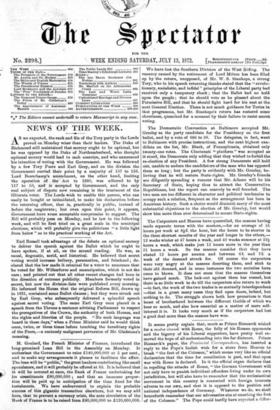NEWS OF THE WEEK.
AS we expected, the rank and file of the Tory party in the Lords proved on Monday wiser than their leaders. The Duke of Richmond still maintained that secrecy ought to be optional, but be was opposed by the Duke of Northumberland, who thought optional secrecy would lead to mob coercion, and who announced his intention of voting with the Government. He was followed by a few Tory Peers and Earl Grey, and on the division the Government carried their point by a majority of 157 to 138. Lord Beauchamp'a amendment, on the other hand, limiting the operation of the Act to 1880, was adhered to by 117 to 58, and is accepted by Government, and the only real subject of dispute now remaining is the treatment of the illiterate voter. The Lords wish to enable this person, who can ,easily be bought or intimidated, to make his declaration before the returning officer, that is, practically in public, instead of before the magistrate ; but even upon this point, it appears, Government have some acceptable compromise to suggest. The Bill will probably pass on Monday, and be law in the following week, and will be first tried on a great scale in the municipal elections, which will probably give the politicians "a little light from below" as to the practical working of the Act.


































